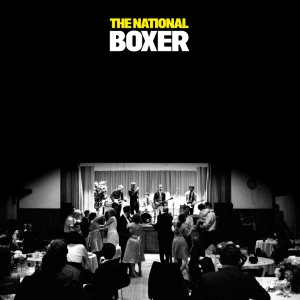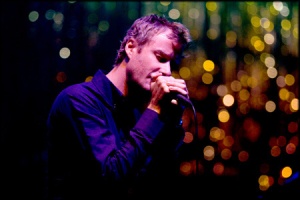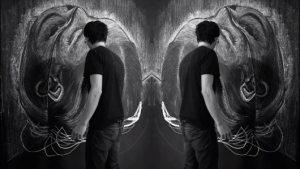Blog Archives
High Violet: My Decade with The National

There are beloved bands, and then there are bands that – to varying degrees of perceptibility – inform and shape chapters of our lives. This could be due to the dual malleability of music and memory, the significance of an event rooted in the band’s work (a formative gig, a chance encounter, a mutual interest), simply hearing the right lyric or melody at exactly the right moment, or any number of other unanticipated and chaotic factors. What is most striking is looking back after a certain interval of time, and only then realising how integral to your experience in life you consider this music to be. If there’s a single band that came closest to bookending and permeating my experience of the 2010s, it’s The National.
Deep in the summer of 2011, I was on a coach journeying from Berlin to Tyrol, with about sixty fellow travellers of the same Euro-touring group. We were taking it in turns plugging our iPods (oh, you bet) into the speakers, bonding over favourites as we exited Germany (and hangovers of varying degrees of severity). We’d been on the road for a few hours and gone through a few rotations, when a new playlist kicked off with a song that immediately arrested my attention. The speaker system wasn’t exactly high-end, but I was swept up by the sound of building drums, carrying with them enough urgency and drama to entice me to shake off the fog and listen closely. A mahogany baritone (the kind that – apparently – inspires jealousy and awe in skinny, bookish teenage males) commanded me to “stand up straight at the foot of your love”. It was one of those honest-to-goodness sucker-punches so often romanticised in pop culture, that reality seldom lives up to. I swiftly sought an answer as to who it was we were listening to. It was – of course – The National, and the song was ‘Bloodbuzz Ohio’.
Jump ahead eight years and four months to 7th December 2019. This was the date that I saw The National perform live for the third time, at the Brighton Centre, for what would be my final gig of the 2010s. The set was a race through a back-catalogue with which I was by then very familiar, but I had entered the gig with the kind of muted expectations that can take root when a band long-established as a favourite begins to blend casually into the background. As with so many things – bands, films, experiences, people – I had started to take their presence for granted, no longer appreciating their work and effect with the same care and reverence. But hearing a set drawn from eight albums’ worth of material – in an unexpected order, and with the weight of years and personal memories now embroidered onto them – brought my history of The National’s music back with revelatory weight.
Both the serendipitous listen on that coach journey and that end-of-the-decade show were lightning-rod moments which rekindled that rare, druglike craving to listen to something over and over again, to plumb the depths of a song in all its splendours and imperfections, to marvel at every new texture, to unpick every lyric. Over the eight years between those episodes, I took so much from The National’s 2010s output, and even now I find myself surprised by how closely (and vividly) these albums are tied to particular times of my life. I obsessively clung to Trouble Will Find Me while moving through a particularly nasty depressive season in 2013 (and in my of-the-time review of the album, I read heavily into every allusion to despondency on the record, no matter how vague or incidental). I first watched Mistaken For Strangers in a tepee in Green Man Festival, weeks after leaving university, with no clue as to what the fuck would happen next. The highlights of Sleep Well Beast and I Am Easy to Find became close companions during the decade’s tail-end, through the ebbs and flows of love, work, and the business of living through surreal political and cultural shocks.
I’m grateful for all the albums that The National released in the 2010s (and those prior), but at this stage of reminiscence, it’s High Violet that I admire and adore the most. Even as the band continues to engage and enthral to this day, it’s the National of High Violet that I consider to be the group’s quintessential form. When locating the record within their history and output, everything – the songwriting, their musical development, their persona on- and off-record – seems to exist in a perfect balance. This album is of a time before Matt Berninger started keeping the weed next to the bed, before Trump cast a pall over their spooked nerves, before the last vestiges of a rougher-edged sound were smoothed away. Berninger had already dialled down the rawness of his earlier performances, but his barely-suppressed rage of the mid-2000s had curdled into a different kind of anxiety. No longer screaming over his nettling insecurities or offering barbed sarcasm, here he is worn out and weary; not as resigned as he would sound on subsequent releases, but his sadness is quiet and deeply felt, and carries resoundingly through his performances, especially during his spotlit turns in ‘Sorrow’ and ‘Runaway’.
High Violet runs at a lean eleven tracks, and musters a unique sonic breadth by The National’s standards. Even at their most cut-and-dry, these songs contain details that distinguish them from the pack: the knotty guitar line which jags through ‘Afraid of Everyone’ like an involuntary shiver, the wailing valves that circle around ‘Little Faith’, the stormy din of horns, drums and piano that crowns ‘England’. Opener ‘Terrible Love’ is the easiest example to reach for, dividing National fans with its thick, woolly distortion in comparison to the pretty shimmer of its alternate recording. To my mind, the album version is an ideal gateway to what follows, its gauzy surrealism ultimately bursting into a frantic, titanic crescendo that establishes the tone, scale and depth of High Violet while remaining unique among its peers in the tracklist (and arguably, in their entire catalogue).
If I had to label it, High Violet is stadium-rock with brains and a beating, leaking heart, delivered in the tone of someone muddied by alcohol and lovesickness, but still coming out swinging. The musical arrangements are steady and stately, but their edges continue to fray and bend with an urgency that the group can’t quite contain, heard in Dessner brothers’ sour guitar interjections or when the irrepressible Bryan Devendorf punches through the fabric of these songs with heavy toms and ballistic cymbals. These may be a band of sad-sacks, but at their best, these sad-sacks conjure magic from beneath the floorboards.
Presiding over it all, Matt Berninger delivers his best work to date as a lyricist. He showcases his continuing knack for killer one-liners (whether of self-deprecating wit or of cutting clarity), and he suspends his scenes between the vividly specific and the disconcertingly abstract. Domestic vignettes are backdropped with biblical imagery on the apocalyptic doom of ‘Little Faith’ (“the storm will suck the pretty girls into the sky”), the griping of ‘Conversation 16’ is painterly in its economic detailing (“[I] fall asleep in your branches”), and the wallowing of the endlessly beautiful ‘Sorrow’ (“Sorrow found me when I was young / Sorrow waited / Sorrow won”) is both plainspoken and profound. There’s plenty to unpack in these carefully-sculpted phrases, and Berninger’s exacting delivery sets a current racing through them on record.
The cumulative effect is wonderful, the album taking in long-term love, the twisted comfort of depression, the physical and emotional challenges of raising children, of reaching midlife while still feeling like half your jigsaw pieces are scattered out of sight. Tension arises from attempts to solve a fragmented present by going back to its genesis, looking backwards while still borne inexorably onwards. Berninger still owes “money to the money to the money” he owes, he struggles to give reason for his decisions (“I gave my heart to the army / the only sentimental thing I could think of”), and turns increasingly inward while wandering through scenes both real and hallucinatory: a Los Angeles cathedral, a “summer-loving torture party”, surging flood waters and swarms of bees. He delivers all with his own time-honed blend of quiet melancholy and dry humour, in that stately croon I instantly fell for on that coach in 2011. (Berninger was even my main inspiration for wanting to grow a beard.)
High Violet is melodically strong and perfectly weighted, thick with detail. By its own merit, it is a masterful piece of work, but my subjective experiences elevate it higher, being as it is the album that introduced me to my band of the decade. Some people look at the work of The Smiths or Talking Heads and say – without a hint of irony – that this is the band which has saved their life. The National are mine, and I continue to draw deeply from their well. Its intoxicating whirlpool of sorrow (and ‘Sorrow’), its conflicts between self-hatred and self-pity, and the desperate, triumphant volume of it all carry something that I can always readily locate within myself. It is confident music written by individuals plagued with doubt, Berninger’s semi-autobiographical stories of fear and longing and daily tribulations open to personal projections from listeners.
Perhaps that’s why I – like so many fans, as evidenced from the song’s throne-like position in so many of their live shows – find High Violet’s conclusion so moving. ‘Vanderlyle Crybaby Geeks’ is not without its wryness (see its verses), but there’s something unironically beautiful, hopeful, and communal in that final reassurance. Over a slow, gravity-defying beat from Bryan Devendorf and backed by the dreamlike strings of Padma Newsome, Berninger leads a warm, wounded cry of “all the very best of us string ourselves up for love”. As The National’s music continued to remind me at numerous junctures in the last decade, our unique stories share common threads, and I’m always grateful when ‘Vanderlyle Crybaby Geeks’ – whether heard on record, at a live show, or simply recalled at a stray moment – repositions me in this community, emotionally if not physically. To this song, this album, and this band, I raise a heavenly glass.
“All the very best of us string ourselves up for love.”
10/05/20

25 Masterworks – The National: Boxer
My Spin on Masterworks: 2 of 25
The National
Boxer
Beggars Banquet Records, 2007
 “Stay down champion stay down. Let them all have your neck.”
“Stay down champion stay down. Let them all have your neck.”
The above phrase can be found inside the booklet that accompanies (the CD edition of) The National’s fourth album: their last full-length to be released via the Beggars Banquet label. Printed in stark white text, and superimposed over a blurry image of the band members wandering through a field, the phrase seems to announce itself as an epigram of sorts; perhaps a subheading for the title Boxer itself. (The phrase actually stems from a pair of lyrics from two separate songs in their discography: the former pulled from ‘Tall Saint’, and the later featuring on ‘Ada’.)
The reason I’ve started by drawing attention to this bit of trivia is because I’ve always found it particularly expressive of the near-mythic status which Boxer has grown to shoulder over the past seven years. It’s possibly the keystone album in The National’s existing discography; summative of the turning-point whereby the group sharpened its focus, and settled on a definitive sound which has since become their signature. The lyrical, tonal, and musical departures of Boxer have been augmented and elaborated in the group’s succeeding two albums, and the results have seldom been less than magical.
On a related note, I should mention that I could quite happily write essays for five of the six existing albums by The National, and still not exhaust everything I feel about the band. However, I’d argue that the richest arc in the band’s history spans the mid- to late-2000s, grounded most overtly in the shift in dynamics which took place between the release of their third and fourth albums. Both Alligator (2005) and Boxer (2007) are cut from similar cloth thematically, but if the former can be personified as a high-strung twenty-something howling his way life, Boxer is that album’s older brother: wearier, more reserved, sharper in perception but ultimately powerless. As such, although Alligator stands as a work of jagged magnificence, Boxer takes the crown, if only because its illusions of elegance are so furiously powerful. All the wine that was name-checked across its three predecessors has stopped fuelling energy, and started churning disappointment.
Although it branches off in a number of more specific subheadings, the main drive behind Boxer is a fixation with what it is to “grow up”. Such a theme may permeate the majority of the band’s oeuvre, but the concept of shouldering responsibility – and all the horror that entails – is particularly sharp in this collection. Yet even in spite of this apparently universal topic, there remains an air of mystery to Boxer; as with all the greatest albums, there’s an intensity rumbling beneath it: a sense that something significant has been registered in these twelve songs. It’s perhaps because of this that I’ve found myself obsessed with the ambiguity of the  album’s title, and that “epigram”. Is the latter an urge for somebody to admit defeat (to “stay down”), or to feint weakness before delivering the killer blow?
album’s title, and that “epigram”. Is the latter an urge for somebody to admit defeat (to “stay down”), or to feint weakness before delivering the killer blow?
It also deepens the discourse surrounding the record’s tortured conception. After the exhausting tours in support of Alligator, the group entered a frictional recording process, rife with frustration – at experimenting, at life’s hardships, and at each other. At the centre of the chain, all eyes were on Matt Berninger, who took painstaking time in carefully penning the new set of lyrics, which in turn forced the others to tinker with already tightly-ratcheted song mechanics. Such a drawn-out process resulted in an allegedly miserable and alienated period, which the Dessner brothers still seem keen to avoid discussing.
And the strain shows in the end product. The arrangements of Boxer sound hot and heavy, pressed down with a claustrophobia which wasn’t entirely present on the lurching Alligator. Naturally (this being The National), the songs themselves are inherently fidgety, but there’s an amplified itchiness driving the likes of ‘Brainy’ and ‘Ada’: a barely-restrained sense of fury which can be picked out of those cacophonous snare rolls and precariously-stacked guitar notes.
Possibly more so than any other National album, Boxer is a nocturne. The shiny city painted by ‘Fake Empire’ gleams in monochrome shades of black, white, and amber: a deceptively romantic sheen which is quickly swept away as night closes in. For all the opener’s poignant majesty, the real world that this album inhabits only properly reveals itself Bryan Devendorf’s elemental drums batter open ‘Mistaken for Strangers’. Sharply awakened from the dreamy stupor of ‘Fake Empire’, the reality becomes clear: this isn’t some Disneyfied “gay ballet on ice”. Such faux-glamour is simply a front for “another uninnocent elegant fall into the unmagnificent lives of adults”. The Dessner siblings intertwine tangibly metallic guitar lines to growl beneath Berninger’s lament for the 9-to-5 shift. By the end of the song, we’re left in the dark, watching the lights glitter away in a muted fanfare of brass.
This inky blackness swirls through the whole of the record, manifesting itself in the muted despair of ‘Racing Like a Pro’, and the uneasy push-and-pull between jealousy and perversion which tars the hypnotic ‘Green Gloves’. The oppressive heat of the album’s first half only lifts long enough for ‘Slow Show’: the closest the band come to producing an anthem on Boxer, and an incredibly affecting portrayal of longing for intimacy. Steadily swelling from a refreshing appearance of acoustic guitars, it serves as a quietly triumphant shedding of Berninger’s armour, eschewing some of his more oblique mannerisms to cut straight to the heart of his awkward pangs of loneliness. Just check out the lyrics in the second verse:
Need to find somewhere I can stand and stay
I leaned on the wall; the wall leaned away
Can I get a minute of not being nervous
And not thinking of my dick?
 On paper, the presence of such a crude allusion seems jarring, but as intoned through Berninger’s nervous baritone, it works perfectly as a descent into direct honesty. On ‘Slow Show’, nothing is dressed up: it’s a direct peer into Berninger’s insecurities, and consequently, makes for a deceptively powerful centrepiece. (And yeah, that’s a very real anxiety.)
On paper, the presence of such a crude allusion seems jarring, but as intoned through Berninger’s nervous baritone, it works perfectly as a descent into direct honesty. On ‘Slow Show’, nothing is dressed up: it’s a direct peer into Berninger’s insecurities, and consequently, makes for a deceptively powerful centrepiece. (And yeah, that’s a very real anxiety.)
Following its less elaborate – but more thematically unified – second half, the album concludes with the plaintive ‘Gospel’: a gentle, unassuming shuffle which only unveils its subtle, heartbreaking power to patient listeners. Grapeshot with painfully vivid scenes of domesticity, Berninger’s vocal melodies are particularly arresting, as they gracefully glide above his bandmates’ patient balladry. It’s a careful, warm touchdown, which closes itself with the album’s most fragile sentiment of all:
Darling, can you tie my string?
Killers are calling on me.
This final image is multifarious, and utterly devastating when properly unpacked. Dependency, yearning, an encroaching departure for some form of war (whether literal, or the battlefield of adulthood’s burdens); it’s all teed up in this final couplet. As Berninger murmurs the refrain one final time, the album fades with a soft sigh of resignation, tinged with the frailest (and cruellest) jot of hope.
No National album comes pre-packaged as a complete story, as Berninger has keenly emphasised during an interview for MOGvideos. Boxer is no different, but it somehow manages to coalesce into a cohesive assembly of small-but-significant moments which epitomise the shouldering of adulthood. The protagonists of Berninger’s fractured portraits are as confused and futile as we can all-too-frequently feel ourselves. These are people who fill themselves with quarters and embrace temporary highs. They fumble through conversations at parties while deeply craving more intimate connections. They build fake empires in their heads and dream of pleasures as simple as hanging up holiday rainbow lights.
And when they get knocked down, sometimes refusing to stay down is the hardest task imaginable.
Boxer 1 Fake Empire 2 Mistaken for Strangers 3 Brainy 4 Squalor Victoria 5 Green Gloves 6 Slow Show 7 Apartment Story 8 Start a War 9 Guest Room 10 Racing Like a Pro 11 Ada 12 GospelAlbum Review: The National – Trouble Will Find Me
NOTE: I don’t normally write disclaimers at the beginning of my reviews, but I’d like to emphasise that the rating I’ve given this album is a personal one. Don’t expect to instantly find gratification within this record. Trouble Will Find Me fell into my lap quite unexpectedly, when I happened to be in the right frame of mind for it to resonate as it did.
 The real cruelty of depression is in its casual nature. A lot of people who suffer from feelings of despair – for no matter how long a period of time – can all too easily deny its presence, dismissing it as a short-term burst of being “down in the dumps”. Although these spells do not necessarily lead to total hopelessness, when they occur on a regular basis, the effects can be just as debilitating.
The real cruelty of depression is in its casual nature. A lot of people who suffer from feelings of despair – for no matter how long a period of time – can all too easily deny its presence, dismissing it as a short-term burst of being “down in the dumps”. Although these spells do not necessarily lead to total hopelessness, when they occur on a regular basis, the effects can be just as debilitating.
Matt Berninger summarises this condition perfectly on the first single from The National’s sixth album. Demons rolls through a collage of set-pieces as its narrator softly realises that he’s being dragged back down once more. “I am secretly in love with / everyone that I grew up with,” Berninger drones, dead-eyed, attempting to prevent his “drowning friends” from noticing the cracks in his armour, until he finally begins to tremble in a desperate plea for help: “Can I stay here? / I can sleep on the floor.” It concludes with a sudden realisation that he is no longer the man he once thought himself to be, in a devastatingly dark moment of black humour and genuine pathos: “When I walk into a room / I do not light it up. / Fuck.”
As an entity, Trouble Will Find Me makes no pretence regarding its bleak tones. Clocking in at a relatively steep fifty-five minutes over a course of thirteen tracks, it’s an album which takes its time to fully address its gloomy subject matter. Such lack of compromise can appear intimidating, especially on the first few listens, when the desolate nature of the songs on offer can feel suffocating, rather than cathartic. But it really is in one’s best interests to persevere, because Trouble Will Find Me is possibly The National’s most emotionally direct album yet. Such adherence to murky topics will not be to everybody’s taste, but as a treatise on depression and its effects, it cuts straight to the bone.
 Musically, things are kept simple, aside from the occasional off-kilter time signature, or a subtle incorporation of orchestration. All the hallmarks of The National’s music are present: Aaron and Bryce Dessner weave fragile guitar patterns above Scott Devendorf’s unobtrusive bass lines, while on songs such as Demons, Bryan Devendorf’s thumping drums pummel the bruises ever deeper. For the most part, the group are wound tight, only sporadically unscrewing the emotional valves before falling back into sombre introspection.
Musically, things are kept simple, aside from the occasional off-kilter time signature, or a subtle incorporation of orchestration. All the hallmarks of The National’s music are present: Aaron and Bryce Dessner weave fragile guitar patterns above Scott Devendorf’s unobtrusive bass lines, while on songs such as Demons, Bryan Devendorf’s thumping drums pummel the bruises ever deeper. For the most part, the group are wound tight, only sporadically unscrewing the emotional valves before falling back into sombre introspection.
This buttoned-down approach comes full circle in the album’s lyrics. Although some will dispute the potency of Berninger’s broader observations, for the most part, he compresses universal feelings in moments of intense personal confession. On I Need My Girl, he recalls an understated moment of breakdown suffered by a loved one: “Remember when you lost your shit / and drove your car into the garden? / You got out and said ‘I’m sorry’ / to the vines, and no-one saw it.” Delivered in Berninger’s broken baritone, the imagery becomes painfully vivid without losing any of its raw, intimate power.
As much as one attempts to battle against misery, it can easily become a comfort blanket: something to writhe around in – even unconsciously – until the true nature of the condition hits home. With repeated plays, Trouble Will Find Me begins to form a kind of cohesion around this sensitive issue. At its length, it remains a little skewed in places, but eventually, everything coalesces to produce a fitting sequence of music. I Should Live In Salt opens the album in a slow fog of acoustic guitars, shakers and a gentle ghazal from Berninger. But soon, pinpricks of electric guitar push through the haze, solidifying the guilt which bleeds from Berninger’s admissions that “I should live in salt for leaving you behind”. From that moment of guilty revelation, proceedings begin to spiral downwards, and there’s no turning back.
 The heartache begins to reveal itself in the pangs of the stunning Don’t Swallow The Cap and the headrush of Sea Of Love, but the two songs which rest at the album’s heart provide the greatest expression of inner turmoil. This Is The Last Time proffers the bleakest moment of all, underpinned by a circling guitar motif before it falls into a funereal coda bedecked with cellos. A breathtakingly ghostly backing vocal from Sharon Van Etten asserts that “it takes a lot of pain / to pick me up”, as the full weight of the despair becomes clear. However, this is swiftly followed by the thrumming urgency of Graceless, perhaps the album’s peak. It weaves a slow-burn euphoria even as its dark heart unravels, building to a beautiful climax which features a miraculous refrain from Berninger. “All of my thoughts of you: / bullets through rotten fruit” he begins, the music rising all around him as he unleashes a wry suggestion to brighten dead minds with flowers. It’s a stunning piece of songwriting, and stands up there with the best of The National’s work.
The heartache begins to reveal itself in the pangs of the stunning Don’t Swallow The Cap and the headrush of Sea Of Love, but the two songs which rest at the album’s heart provide the greatest expression of inner turmoil. This Is The Last Time proffers the bleakest moment of all, underpinned by a circling guitar motif before it falls into a funereal coda bedecked with cellos. A breathtakingly ghostly backing vocal from Sharon Van Etten asserts that “it takes a lot of pain / to pick me up”, as the full weight of the despair becomes clear. However, this is swiftly followed by the thrumming urgency of Graceless, perhaps the album’s peak. It weaves a slow-burn euphoria even as its dark heart unravels, building to a beautiful climax which features a miraculous refrain from Berninger. “All of my thoughts of you: / bullets through rotten fruit” he begins, the music rising all around him as he unleashes a wry suggestion to brighten dead minds with flowers. It’s a stunning piece of songwriting, and stands up there with the best of The National’s work.
This isn’t to say that the whole thing fits together perfectly. Although Humiliation and the swelling dread of Fireproof are both powerful in themselves, they can seem a little ill-fitting in their sequencing: adrift in such a turbulent maze. But as the album winds down and Berninger realises that, in reality, there is no quick fix available, his acceptance provides a transcendental poignancy. Hard To Find may be something of a predictable choice of closer, but within its parameters, it works beautifully. It finds The National searching the night sky, catching glimpses of what may be hidden in the past, but even as the twinkling spirals of the Dessner brothers escalate, it never flutters away. Instead, Berninger accepts his present condition with a sigh that “they can all just kiss off in the air”, before the record closes with a final, gentle fade.
Depression is not something one simply chooses to wallow in. Quite the opposite: it consumes the individual. The National recognise the absurdity of such a scenario, while at the same time being powerless against its current. At first, it may seem overly mopey and too content to bask in its own sadness, but this is an album which lodges in the mind and rests there. Even if it doesn’t possess the greatness of Boxer or the force of High Violet, Trouble Will Find Me’s treatise on depression gets under the skin in a way which is simultaneously haunting and unspeakably uplifting.
To reiterate a tired point once more, perseverance is needed. If you’ve ever felt even the shortest sting of despondency, listen up. The magic will find you.
9/10
“Wonder if you live there still, / kind of think you always will. / If I tried, you’d probably be / hard to find.”
30/05/13